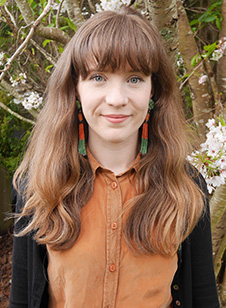A shift towards the use of long-acting reversible contraceptives, particularly by young women, is associated with declining abortion rates in New Zealand, new research has found.
The research was conducted by Ms Catherine Whitley, as part of her Master of Public Health degree at the University of Otago, Wellington.

Ms Catherine Whitley 2019.
Ms Whitley found the increasing popularity of long-acting contraceptives, which include hormone implants and intrauterine devices (IUDs), is linked with an unprecedented decline in New Zealand's abortion rate.
In 2007, the abortion rate was 20.1 per 1,000 reproductive-aged women, and by 2014 it had declined to 14.4 per 1,000. The decline in abortion is particularly marked in younger women, with abortion rates almost halving for 15 to 19 year olds and falling from 37.6 to 25.2 for 20 to 24 year olds.
Ms Whitley says that once the government began subsidising the two-rod hormone implant, Jadelle, in 2010 it quickly became a popular contraceptive choice for women. Another long-acting contraceptive, the copper IUD, has been subsidised since 1994.
"It is likely that a shift toward use of long-acting reversible contraceptives by younger women (the group with the most marked decline in abortion rates in New Zealand) partly explains the association between the use of these methods and the declining abortion rates.
"Young women are more likely than older women to experience contraceptive failure when using short-acting contraception, such as condoms or the oral contraceptive pill.
"A shift towards 'fit and forget' methods by younger women would therefore have a greater impact on unintended pregnancy rates for this group."
Ms Whitley says long-acting contraceptives are highly effective and have many benefits, including the choice of hormonal or non-hormonal methods.
They also make it easier for women to space their pregnancies which, in turn, reduces their likelihood of an unplanned pregnancy that could end in abortion, she says.
Ms Whitley's study is the first published research to examine the reasons for New Zealand's declining abortion rates - and the first to report on national patterns of contraceptive use over time.
"The research highlights the positive impact that access to a range of no or low-cost contraceptives can have on fertility control," she says.
"Barrier-free access to all methods of contraception, including choice of the most effective long-acting methods should be a sexual reproductive health right afforded to all women, together with access to safe and timely abortion."
Ms Whitley welcomes the decision by PHARMAC to subsidise two additional forms of long-acting contraception, the levonorgestrel IUDs Mirena and Jaydess, from 1 November.
"This will give women greater choice when accessing long-acting reversible forms of contraception."
The research paper, 'Association Between Women's Use of Long-Acting Reversible Contraception and Declining Abortion Rates in New Zealand' is published in the Journal of Women's Health.






